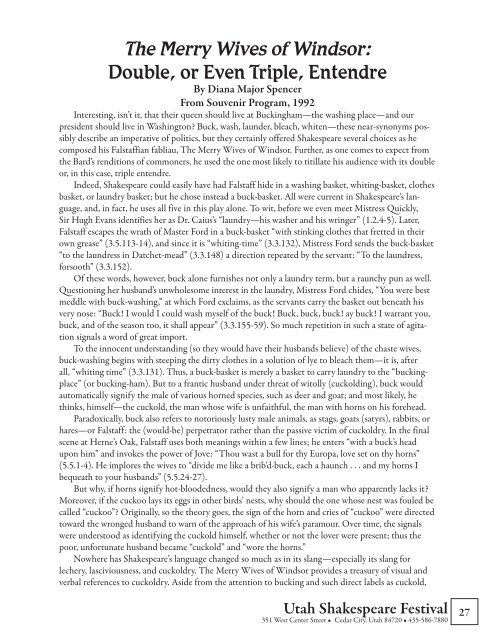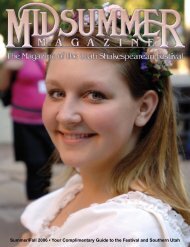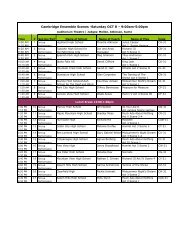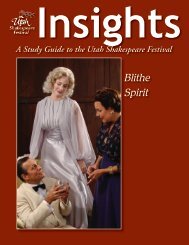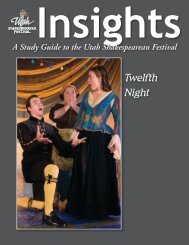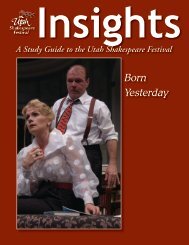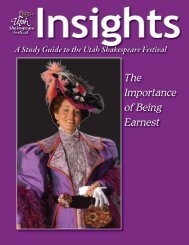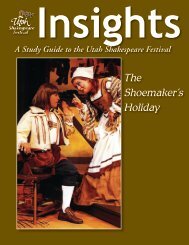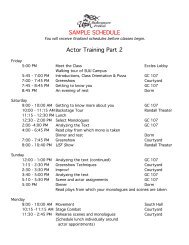View and print the complete guide in a pdf file. - Utah ...
View and print the complete guide in a pdf file. - Utah ...
View and print the complete guide in a pdf file. - Utah ...
Create successful ePaper yourself
Turn your PDF publications into a flip-book with our unique Google optimized e-Paper software.
The Merry Wives of W<strong>in</strong>dsor:Double, or Even Triple, EntendreBy Diana Major SpencerFrom Souvenir Program, 1992Interest<strong>in</strong>g, isn’t it, that <strong>the</strong>ir queen should live at Buck<strong>in</strong>gham—<strong>the</strong> wash<strong>in</strong>g place—<strong>and</strong> ourpresident should live <strong>in</strong> Wash<strong>in</strong>gton? Buck, wash, launder, bleach, whiten—<strong>the</strong>se near-synonyms possiblydescribe an imperative of politics, but <strong>the</strong>y certa<strong>in</strong>ly offered Shakespeare several choices as hecomposed his Falstaffian fabliau, The Merry Wives of W<strong>in</strong>dsor. Fur<strong>the</strong>r, as one comes to expect from<strong>the</strong> Bard’s renditions of commoners, he used <strong>the</strong> one most likely to titillate his audience with its doubleor, <strong>in</strong> this case, triple entendre.Indeed, Shakespeare could easily have had Falstaff hide <strong>in</strong> a wash<strong>in</strong>g basket, whit<strong>in</strong>g-basket, clo<strong>the</strong>sbasket, or laundry basket; but he chose <strong>in</strong>stead a buck-basket. All were current <strong>in</strong> Shakespeare’s language,<strong>and</strong>, <strong>in</strong> fact, he uses all five <strong>in</strong> this play alone. To wit, before we even meet Mistress Quickly,Sir Hugh Evans identifies her as Dr. Caius’s “laundry—his washer <strong>and</strong> his wr<strong>in</strong>ger” (1.2.4-5). Later,Falstaff escapes <strong>the</strong> wrath of Master Ford <strong>in</strong> a buck-basket “with st<strong>in</strong>k<strong>in</strong>g clo<strong>the</strong>s that fretted <strong>in</strong> <strong>the</strong>irown grease” (3.5.113-14), <strong>and</strong> s<strong>in</strong>ce it is “whit<strong>in</strong>g-time” (3.3.132), Mistress Ford sends <strong>the</strong> buck-basket“to <strong>the</strong> laundress <strong>in</strong> Datchet-mead” (3.3.148) a direction repeated by <strong>the</strong> servant: “To <strong>the</strong> laundress,forsooth” (3.3.152).Of <strong>the</strong>se words, however, buck alone furnishes not only a laundry term, but a raunchy pun as well.Question<strong>in</strong>g her husb<strong>and</strong>’s unwholesome <strong>in</strong>terest <strong>in</strong> <strong>the</strong> laundry, Mistress Ford chides, “You were bestmeddle with buck-wash<strong>in</strong>g,” at which Ford exclaims, as <strong>the</strong> servants carry <strong>the</strong> basket out beneath hisvery nose: “Buck! I would I could wash myself of <strong>the</strong> buck! Buck, buck, buck! ay buck! I warrant you,buck, <strong>and</strong> of <strong>the</strong> season too, it shall appear” (3.3.155-59). So much repetition <strong>in</strong> such a state of agitationsignals a word of great import.To <strong>the</strong> <strong>in</strong>nocent underst<strong>and</strong><strong>in</strong>g (so <strong>the</strong>y would have <strong>the</strong>ir husb<strong>and</strong>s believe) of <strong>the</strong> chaste wives,buck-wash<strong>in</strong>g beg<strong>in</strong>s with steep<strong>in</strong>g <strong>the</strong> dirty clo<strong>the</strong>s <strong>in</strong> a solution of lye to bleach <strong>the</strong>m—it is, afterall, “whit<strong>in</strong>g time” (3.3.131). Thus, a buck-basket is merely a basket to carry laundry to <strong>the</strong> “buck<strong>in</strong>gplace”(or buck<strong>in</strong>g-ham). But to a frantic husb<strong>and</strong> under threat of witolly (cuckold<strong>in</strong>g), buck wouldautomatically signify <strong>the</strong> male of various horned species, such as deer <strong>and</strong> goat; <strong>and</strong> most likely, heth<strong>in</strong>ks, himself—<strong>the</strong> cuckold, <strong>the</strong> man whose wife is unfaithful, <strong>the</strong> man with horns on his forehead.Paradoxically, buck also refers to notoriously lusty male animals, as stags, goats (satyrs), rabbits, orhares—or Falstaff: <strong>the</strong> (would-be) perpetrator ra<strong>the</strong>r than <strong>the</strong> passive victim of cuckoldry. In <strong>the</strong> f<strong>in</strong>alscene at Herne’s Oak, Falstaff uses both mean<strong>in</strong>gs with<strong>in</strong> a few l<strong>in</strong>es; he enters “with a buck’s headupon him” <strong>and</strong> <strong>in</strong>vokes <strong>the</strong> power of Jove: “Thou wast a bull for thy Europa, love set on thy horns”(5.5.1-4). He implores <strong>the</strong> wives to “divide me like a brib’d-buck, each a haunch . . . <strong>and</strong> my horns Ibequeath to your husb<strong>and</strong>s” (5.5.24-27).But why, if horns signify hot-bloodedness, would <strong>the</strong>y also signify a man who apparently lacks it?Moreover, if <strong>the</strong> cuckoo lays its eggs <strong>in</strong> o<strong>the</strong>r birds’ nests, why should <strong>the</strong> one whose nest was fouled becalled “cuckoo”? Orig<strong>in</strong>ally, so <strong>the</strong> <strong>the</strong>ory goes, <strong>the</strong> sign of <strong>the</strong> horn <strong>and</strong> cries of “cuckoo” were directedtoward <strong>the</strong> wronged husb<strong>and</strong> to warn of <strong>the</strong> approach of his wife’s paramour. Over time, <strong>the</strong> signalswere understood as identify<strong>in</strong>g <strong>the</strong> cuckold himself, whe<strong>the</strong>r or not <strong>the</strong> lover were present; thus <strong>the</strong>poor, unfortunate husb<strong>and</strong> became “cuckold” <strong>and</strong> “wore <strong>the</strong> horns.”Nowhere has Shakespeare’s language changed so much as <strong>in</strong> its slang—especially its slang forlechery, lasciviousness, <strong>and</strong> cuckoldry. The Merry Wives of W<strong>in</strong>dsor provides a treasury of visual <strong>and</strong>verbal references to cuckoldry. Aside from <strong>the</strong> attention to buck<strong>in</strong>g <strong>and</strong> such direct labels as cuckold,<strong>Utah</strong> Shakespeare Festival351 West Center Street • Cedar City, <strong>Utah</strong> 84720 • 435-586-788027


